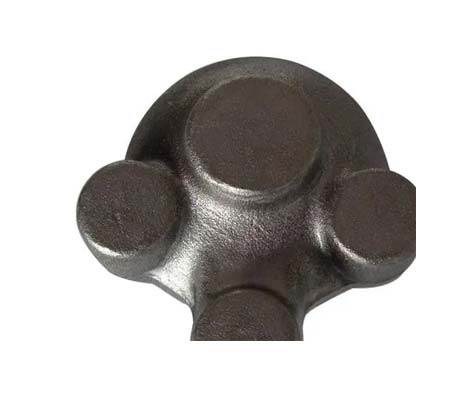- Contact Innally, Let you purchase forgings in China more favorable prices, products more assured!
- Hotline:+(86)15038323776 Email:innally@innally.com
What is the production process of agricultural machinery forging?
- Category: Mechanical forgings for metalworking, Stainless steel forging
- |
- Date: 12/10/2023
the production process of agricultural machinery forgings is a multi-link, multi-factor process, which requires comprehensive quality control and technical management from raw material selection to finished products. Only by continuously improving the level of production technology and management capabilities can we produce high-quality and high-performance agricultural machinery forgings to meet the needs of agricultural machinery and equipment and promote the development of agricultural machinery industry.
Product Details
The production process of agricultural machinery forgings is a multi-step process, which involves material selection, processing and quality control. Below we will introduce the production process of agricultural machinery forgings in detail.
First, material selection
The first step in the production of agricultural machinery forgings is to choose the right material. Commonly used materials include carbon steel, alloy steel, aluminum alloy and so on. These materials need to have high strength, corrosion resistance, wear resistance and other characteristics to ensure that the forging can maintain a stable working condition in the harsh working environment.
Second, processing technology
Forging: Forging is an important part of the production of agricultural machinery forgings, through repeated forging can remove impurities and pores in the material, improve the density and strength of the material. The forging process needs to use a large forging hammer or press, which has high requirements for equipment and operators.

Molding: Molding is the processing of the material into the desired shape and size by heating the material and pressing the mold. The molding process requires attention to temperature control and mold design to prevent cracks and other defects.
Cutting processing: Cutting processing is to turn, milling, drilling and other processing of the forging to complete the final shape and accuracy requirements of the forging. Cutting requires the use of corresponding machine tools and tools, and the skills of the operator are high.
Third, quality testing
Quality inspection is an important link to ensure the quality of agricultural machinery forgings. In the production process, it is necessary to carry out several tests on the forging, including size testing, appearance testing, non-destructive testing, etc. These tests help identify and deal with problems that arise during the production process, ensuring that each forging meets quality requirements.
Four, the key process
In the production of agricultural machinery forgings, there are several key processes that require special attention, including forging, forming and heat treatment.
Forging: Forging is an important part of the production of agricultural machinery forgings, and it is necessary to ensure that the material is fully forged to achieve the required density and strength. At the same time, attention should be paid to avoid problems such as cracks and pores in the forging process.
Molding: Molding is the heating of the material into the mold, by pressing or other means to form the material into the desired shape and size. This process needs to ensure mold design and material temperature control to prevent forming defects.
Heat treatment: Heat treatment is an important process to improve the comprehensive performance of agricultural machinery forgings. Proper heat treatment can improve the mechanical properties of the material, improve its wear resistance, fatigue resistance and corrosion resistance. In the heat treatment process, attention should be paid to temperature and time control, as well as the adjustment of cooling speed to prevent quality problems such as quenching cracks.
- Precautions
In the production of agricultural machinery forgings, the following points need to be noted:
Safety measures: pay attention to the safety of personnel and equipment in the production process. For dangerous equipment such as large forging hammers, operators must be professionally trained and licensed to work. At the same time, check and maintain the equipment regularly to ensure the normal operation of the equipment.
Quality control: To establish a strict quality control system, from the raw materials into the warehouse to the finished products, every link to carry out quality testing and control. For unqualified forgings to be repaired or scrapped, to avoid entering the market to affect product quality and corporate reputation.
Energy saving and emission reduction: In the production process, attention should be paid to energy saving and emission reduction, the use of advanced technology and equipment to reduce energy consumption and pollution emissions. At the same time, we should actively promote green manufacturing technology, improve resource utilization, and reduce the impact on the environment.
Technological innovation: It is necessary to continuously carry out technological innovation to improve the performance and quality of agricultural machinery forgings to meet the changing market demand. At the same time, we should pay attention to the development trend of the industry, timely adjust the product structure and production process, and maintain the competitiveness of enterprises.
In short, the production process of agricultural machinery forgings is a multi-link, multi-factor process, which requires comprehensive quality control and technical management from raw material selection to finished products. Only by continuously improving the level of production technology and management capabilities can we produce high-quality and high-performance agricultural machinery forgings to meet the needs of agricultural machinery and equipment and promote the development of agricultural machinery industry.
nannan
INNALLY mainly provides you with various types of cast and forged parts products. Welcome your inquiries! innally@innally.com
Related Products
Search
Forging center
- Steel forgings
- Aluminium alloy forging
- Titanium alloy forging
- Stainless steel forging
- Copper forging
- Automotive forgings
- Locomotive forging
- Bicycle forgings
- Motorcycle forging
- Rigging and fasteners
- Bearing forging
- Electric power fittings
- Marine forging
- Mechanical forgings for metalworking
- Mining machinery forgings
- Marine engineering forgings
- Construction machinery forgings
Popular product

© 2025. All Rights Reserved.






